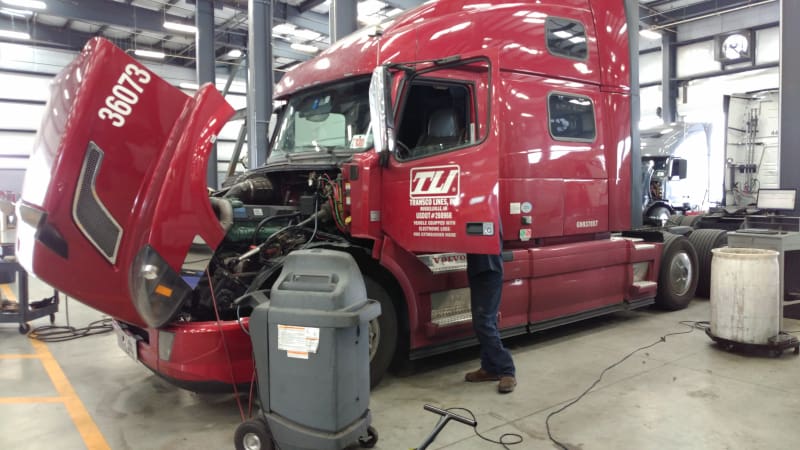
For the last several years, OEMs and suppliers have ramped up predictive maintenance solutions as the way to improve uptime of their vehicles and reduce unnecessary costs for fleets. Most of those options rely on data that can accurately predict when parts are likely to wear out. Onboard diagnostics have been added to the package that identify and notify fleets in real-time when something goes wrong with the vehicle. But few, if any, options use artificial intelligence (AI) the way Uptake is doing.
The company, an artificial intelligence firm based in Chicago, uses data science to solve productivity problems. It has teamed up with Geotab, one of the world’s largest data collection and supplier of sensors for commercial vehicles, to offer a new AI-powered fleet management tool.
Hoyoung Pak, head of transportation and logistics for Uptake, tells FreightWaves the collaboration with Geotab is crucial to the success of the Uptake fleet management solution.
“We needed to get the sensor data; without the sensor data you have no shot,” he explains. “Geotab does a really good job at pulling data that is very efficient.”
The Uptake system uses those sensors – more than 100 currently – to collect data from the truck and its components and infuse that data with artificial intelligence to form a truly predictive analytics system that incorporates critical contextual information such as weather and historical data. Geotab’s devices use a patented efficiency algorithm that enables them to rapidly transmit data from sensors on a truck into the cloud.
“OEMs typically look at sensor data, but they tend to look at [one data set at a time],” Pak says. To illustrate the importance of contextual data, Pak turns to a person’s heart rate test. A heart rate of 140 while watching TV would indicate a problem, but a heart rate of 140 while running a marathon may not be a concern. It’s that context that matters, he says. By adding context to vehicle data, fleets can get better insight into the operation of that vehicle and reduce unplanned downtime.
“It not only looks at what part of the truck is unhealthy, but what specific component is unhealthy,” Pak notes.
“OEMs will use thresholds, such as [the vehicle] being low in DEF, so you drive a little further and fill it up,” he adds, “but it does not tell you there is a leak. We do that” because the AI calculates the expected rate of usage based on miles driven. “If the DEF starts to drop at a precipitous rate, we tell you something is wrong.”
Weather is an excellent example, Pak says. Higher temperatures can alter coolant levels, but simply looking at the coolant level does not tell the whole story. Adding the ambient temperature of the truck and how long it was in that environment can alter the determination of why coolant levels are off.
“Once you have that data, you can apply artificial intelligence and machine learning” to find the true extend of the problem, if there is one, Pak says.
The Uptake system triangulates a truck’s location and weather at that location at that time.
“Uptake’s ability to predict equipment failures with an incredibly high level of precision, even down to the sub-component level, has not been possible before in this industry,” Scott Sutarik, associate vp of Commercial Vehicle Solutions at Geotab, says. “By aligning with Uptake, Geotab customers can access a new level of detailed, actionable data to help prevent unplanned downtime, improve their bottom line and stay competitive.”
One of the problems fleets today are facing is data overload. The Uptake software prevents this by only notifying fleets when their trucks are at risk of breaking down. For example, it can identify voltage fluctuations that indicate a pending alternator failure, or that the diesel particulate filter needs to be cleaned sooner than expected.
“Ultimately, it is up to the clients [on what to do],” Pak says. “But we provide the information in a way that is easy to understand.”
Pak says the Uptake solution covers between 80% and 90% of the fleet’s biggest maintenance expense items, and can provide benefits such as reduced fuel cost through more efficient vehicle operation and lower maintenance costs – especially unplanned costs.










